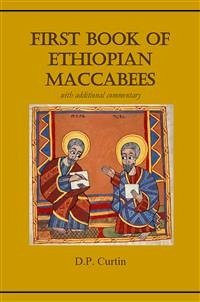The text has 36 chapters in total, and gives the account of two separate revolts against Seleucid rule over Judea. The first account begins by stating that there was an idol-worshiping king of Media and Midian who is devoted to the cult of his idols. Unlike the more familiar narrative found in the books of Maccabees, his name is given as '"Tsirutsaydan". This appears as a folk memory of the historical Seleucid king Antiochus IV Epiphanes, who held court at the Phoenician cities, after he began minting coins with the names "Tyre and Sidon" (Tsur u Tsaydan) stamped in Punic alongside his image. According to this book, a certain man from the territory of Benjamin called Meqabis had three sons Abya (Amharic: አብያ- Abijah), Seela (Amharic: ሴላ- Shelah), and Pantos (Pantera), who opposed the tyrannical policies of the king and refused to worship his idols. Their account consumes only a short section of the book, spanning chapters 2 through chapter 5. They are noted elsewhere in the hagiographical text of the Ethiopian Synaxarion, and hold a feast day within the Ethiopian Church. A second group of brothers are later introduced in Chapter 15. They are called: Yihuda (Amharic: ይሁዳ- Judah), Meqabis and Mebikyas, and they are said to have led a successful revolt against the ruthless King Akrandis of Midian. This appears to be a historical allusion to the king Alexander I Balas, who ruled the Seleucid Empire after the death of Antiochius IV,[5] and who supported the legitimacy of the Maccabees cause. However, in this folk rendering of history, Mebikyas enters the king's military camp and decapitates him at his dinner table, while his food was still in his mouth. The remainder of the book, chapters 16 to 36, have no dealing with the Maccabee revolt and offer no further historical narrative. Their purpose is unknown, as they recount significant events from the Old Testament.
Bitte wählen Sie Ihr Anliegen aus.
Rechnungen
Retourenschein anfordern
Bestellstatus
Storno









